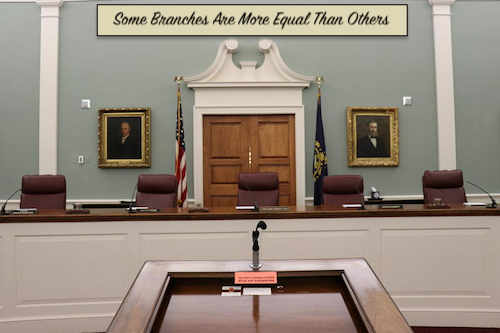Should it become interested in doing so, here’s a way for the legislature to start taking back some of the power that it’s allowed the judiciary to siphon from it over the centuries.
Related: Gen. Stark Would Be Marching His “Armed Protesters” to Gov. Sununu’s Door
The key idea is to pre-empt the court’s ability to rewrite laws from the bench by creating a kind of ‘judicial sunset provision’ that would apply to any statute or regulation that gets ‘interpreted’ by an appeals court.
This would be analogous to the sunset provisions that are now routinely attached to new legislation.
A law with such a provision goes into effect, and after some amount of time, if it’s not renewed or amended, it expires. The 1994 Assault Weapons Ban, which expired in 2004, is perhaps the best-known example of this.
But instead of being triggered by the passage of time, judicial sunset provisions would be triggered by the action of a court.
That is, judicial sunsetting would take the form of an RSA that would say, roughly:
If any appeals court returns a split decision when considering any RSA or departmental regulation, the RSA or regulation will be declared void for vagueness until such time that the source of the vagueness is addressed by the legislature or the relevant department through its normal legislative or rule-making process. As a corollary, any split decision by the state supreme court when considering the state constitution will itself be considered advisory, with no legal effect whatever.
(Of course, the sunset RSA would itself have to be exempt, since otherwise, it would be the easiest thing in the world for the courts to just issue split decisions regarding it. But that’s just one of the details that need to be worked out.)
Note that it shouldn’t be necessary to do this. If the highly-educated members of a judicial panel can’t agree on what something means, then there’s no way that anyone else can be expected to know what it means. And as Justice Gorsuch recently reminded us, due process forbids punishing anyone for violating a law whose meaning depends on who’s reading it. So what I’m suggesting here is already required by the 14th Amendment. Required, but routinely ignored.
Allowing judges to rewrite a vague law or regulation on the fly — not by changing the words, but by changing the meanings of the words — does violence to (1) the English language itself, and (2) the constitutional declaration that legislative power is delegated to the legislature.
Again, this isn’t a new idea. Gorsuch’s predecessor, Justice Scalia, complained about the tendency of courts to ‘endure whatever interpretive distortions it takes in order to correct a supposed flaw in the statutory machinery’, an approach that
ignores the American people’s decision to give Congress ‘All legislative Powers’ enumerated in the Constitution (Article 1, Part 1). They made Congress, not this Court, responsible for both making laws and mending them. This court holds only the judicial power — the power to pronounce the law as Congress has enacted it. We lack the prerogative to repair laws that do not work out in practice.
Right now, all three branches of the state government are in the hands of a party whose alleged goal is to reduce the size and scope of government. There’s almost nothing that could be done to move the ball farther towards that goalpost than returning to the legislature the power that it alone was created to exercise.
But if the legislature prefers to leave the judiciary in its current position as the ‘most equal’ of the equal branches of government, then of course it should just ignore this opportunity and continue with business as usual.
